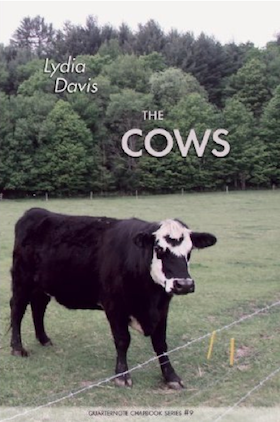Elisa Gabbert pointed out
this interesting sociological experiment, a survey of
MetaFilter users "who read widely but don't read poetry" on why they don't read poetry. Results anthologized in EG's post, though she omitted my favorite (); a majority of the answers are ignorant/silly rationalizations like
- Poetry--it seems to me--will only bring greater understanding of one particular person's inner thoughts and feelings: the poet.
- I have a strong sense that it is contrived.
Like all obvious rationalizations, these don't hold up well; they also tend to shift the blame onto "poetry"/"poets" in general, as though, if poetry were nicer to them, they'd give it a chance. The generalizations are grating -- e.g., "[random myth] is the blessing
and the curse of poetry" -- but I don't want to dwell on this end of things. The real question with rationalizations is what's behind them: are the stated reasons stand-ins for actual reasons or for laziness and prejudice? (The answer is both, I imagine, but in what proportions?) Reading the responses charitably I can either understand or sympathize with 3.5 reasons:
- (the half-reason) The poetry culture is off-putting, "poets sometimes recite their poetry in these hushed, reverent tones," etc. This is not a v. good reason but seeing that one has lots of things to do, it is reasonable to avoid whatever seems dreary. I, too, dislike poetry readings; it's hard to hear the linebreaks, you can't rewind, etc. -- it's often like doing a crossword from 1-across to 69-down. I'm not surprised that casual attendees come away baffled and bored.
- Poetry is dense, slows you down, is demanding, etc. Reasonable in general but a little narrow-minded; one's reading doesn't have to be escape reading. (There is a case to be made that reading poetry impairs your ability to read certain sorts of thriller, when written very badly as they sometimes are. And maybe one gets a sense of accomplishment out of the sheer volume of what one has read...)
- "I want a story or facts, not snippets of writing." / "I don't 'get' poetry." The more and less self-aware versions of not looking for, or not caring about, language as an end in itself. This is a respectable view; language has lots of perfectly good non-decorative purposes.
- It's hard to find good poetry books, relative to (say) good literary fiction. You don't have the constant ambient buzz of critical judgments and recommendations -- word-of-mouth, NYTBR, etc. -- that you do with fiction and nonfiction. "You don't know where to start." I'd add that as poetry reviewers go there are no figures analogous to Dwight Garner or James Wood, whose approval guarantees an at least somewhat enjoyable book.
[An interesting feature of the replies: the "avid readers" screen basically worked. I approve of the screening: it is useful to separate the question of why people don't read
poetry from that of why they don't
read. The discourse that (e.g.)
this post belongs to, though valuable, is different from why, say, Franzen readers don't read poetry.]
---
The Q. of where to start is an interesting one. Primary possibilities: (1) a class, (2) friends, (3) an anthology, (4) a review. I have no business talking about (1), but see
Kathleen Rooney's comment. (2) and (3) are similar in that, as the reader isn't being guided through the poems, the optimal poem is one that reads itself. Which brings one to the question -- which I meant to blog about before the proem ran away with the post -- of what makes a poem an efficient enticement to poetry in general.
I do not think "accessibility" in the ordinary sense is the issue; Eliot's remarks (in the Jonson essay in
The Sacred Wood) ring true to me:
Shakespeare, and smaller men also, are in the end more difficult [than Ben Jonson], but they offer something at the start to encourage the student or to satisfy those who want nothing more; they are suggestive, evocative, a phrase, a voice; they offer poetry in detail as well as in design.... But the polished veneer of Jonson reflects only the lazy reader's fatuity.
As a lazy adolescent I had my fatuity reflected at me by, say, Elizabeth Bishop and Frost and Yeats; I could "understand" the poems, but didn't see why they were supposed to be good. The first poems that really clicked -- in the sense of showing that there were possibilities that were essentially endemic to poetry -- were the poems in the first half of
Prufrock, esp. "Prufrock," "Preludes," and "Rhapsody." (E.g. "The conscience of a blackened street / impatient to assume the world" -- I found it extremely neat that you could systematically get a certain kind of "effect" out of tacking the adjective onto the wrong noun.) Similarly e.e. cummings seems to draw people into poetry, and I've known early Stevens to work for some people. A lot of this is subjective: the reason (say) Dylan Thomas wasn't appealing to me as an adolescent was that I wanted to be reassured that poetry was "OK for boys," could be clever and cerebral, etc. -- I found it strangely reassuring that Bertrand Russell had had an affair with the first Mrs. Eliot. Others would have been turned off, and probably were, by precisely these things...
What emphatically would not have worked -- and I suspect won't work in general -- is unobtrusively brilliant phrasing as in middle-period Yeats; anything that can be missed will be missed if one is in the habit of reading things fast; any metaphors that can be taken "metaphorically" won't work. "Mackerel-crowded seas," for instance; it's not the expected verb but it's not unexpected enough either; there
are mackerel in the seas; the evening as "a patient etherized upon a table" is a different story. I'd be very surprised if anyone used to high-volume prose reading got interested in poetry through Ashbery or Frank O'Hara. (On the other hand, it seems plausible that one might first get interested in poetry in a foreign language when one's learning the language, so that one hasn't zoned out the writing yet. This is one possible mechanism, btw, by which the demise of classical education might have assisted the general decline in the audience for poetry.)
PS: See
David Orr on how Larkin was the first poet he understood. This might be a different question from the poet who first got you interested in poetry as a medium; I imagine Orr already knew how to read poetry when he got out of college. All the same, Larkin is often a fairly flashy writer ("They fuck you up, your mum and dad") -- though maybe not at his best.















